Martyr Mohammad Javadi
Brother of Martyr Hadi Javadi
Father’s name: Abbas Ali
Date of birth: August 24, 1955
Place of birth: Ferdows
Date of martyrdom: May 3, 1982
Place of martyrdom: Khorramshahr
Burial place: Ferdows
Biography of
Martyr Mohammad Javadi, a teacher, was born on September 1, 1954, in a religious family in the city of Ferdows. After six years of his life, he entered Hemmat Elementary School and continued his education with great enthusiasm. After elementary school, he went to high school and studied at Ferdowsi High School. Despite the environment that Taghut provided for the youth of that day, just as he was a person bound by Islamic rules, he invited his companions and classmates in the same way. It was during high school that Muhammad learned the alphabet of the revolution, and it was from that time that Muhammad’s struggle with the Taghut and the Taghutians began that with the repression of the SAVAK, Muhammad did not stop exposing and enlightening for a moment.

Mohammad, after receiving his diploma in 1975, left for Mashhad as a soldier and from there he was sent to the mirage of East Azerbaijan. He was in that land for 6 months and became the custodian of the garrison mosque and guided the youth.
After training, he grew up as a knowledge corps in one of the villages of Babylon (called Balachobast). And he played an important role in serving the oppressed and the deprived, and his immediate services in building baths, mosques, roads, Hosseiniyahs, and development of the villages of that land for the deprived villagers there can never be forgotten. At that time, as the martyr himself described, he was taken from the district and the governorate and governorship were always reprimanded in his revelations against the hated Pahlavi regime, and finally Muhammad was a well-known figure among the villagers and the grief-stricken deprived villagers of that area.
It was during this period that he continued his struggle stubbornly against the Pahlavi regime. After a while, he became acquainted with Dr. Tabarsipour and enjoyed many blessings, and through him, he provided the proclamations and tapes of the Imam of the Nation to the followers of the Imam. Eventually, Mohammad’s military service ended and Mohammad returned to his hometown of Ferdows. From then on, it was less of a night that Mohammad did not distribute leaflets or tapes in the city. He had mobilized the Shah’s agents throughout the region. It was at that time that Muhammad prepared himself for a public struggle and even armed himself with the weapons he had provided freely.
Shouts of Barkhomini’s greetings and the death of his king are still echoing in the atmosphere of the Islamic Grand Mosque. Mohammad was arrested by the regime and transferred to the gendarmerie prison, and after a few days to the police prison, and after much interrogation and threats, he was transferred to Vakilabad prison in Mashhad with 25 other brothers and tried in the army court. He was a dozen unveiled and multi-military, with a high degree of faith he condemned them all. According to one of the brothers, we thought that Muhammad had been invited to a chelokbabi. He was in such a high mood that some of the brothers were pale. He said that you can not close your heart. Vakilabad prison was over and the martyr was released due to the marches of the Mashhad sisters and the fear of the government of that time. The prison period was very productive for him and others because there were more than four or five thousand political prisoners in Vakilabad prison, headed by the militant clerics of the province. After his release, he fought against the regime with more force and took the lead in the demonstrations.
He played an important role in fleeing the army of that day.
Muhammad never stopped moving, and in principle, silence and stillness never compromised with his tumultuous spirit. In recent years, Muhammad was a teacher in the villages of Sarand, Soft, Nodeh, Karimo and Mosabi, and what valuable activities he did for the welfare of the deprived people of these villages. He did not know day and night in this way. He listened to his young students. The martyr got married on May 1, 1981 and was martyred on the night of the 13th of Khordad in the year 1361, and his son was born at the same time as his martyrdom on the night of June 12, 1360.
He served as the mayor of Islamia for some time. During the Iraq war, he participated in the right-against-wrong front three times. For the first time, his activity in conquering the body of the pilgrims was very impressive. On his last trip to take part in the operation to conquer Khorramshahr, he had made a will as follows:
Indeed, God provided the believers with the souls of those who bought their souls and ours, and in return, Paradise.
Yes, brothers and sisters, and fathers and mothers, who are willing to deal with God, and in return you offer paradise to your loved ones and pieces of your liver. Let us go to the fronts of truth against falsehood and pay our respects to our dear Islam and Hussein Zaman, the leader of the revolution, and know that I am Mohammad Javadi, who is a partial soldier. I agreed to show my presence on the front for the third stage. I took part in this divine test with the certainty that if I win, I will visit Mr. Abdullah Al-Hussein in Karbala, and if, God willing, I will be martyred, I will visit him.
He truly loved Karbala and Hussein (AS) and his martyrdom confirmed this love. The promised moment had arrived. Martyr Mohammad Javadi met his beloved in the middle of the night on 13/3/1361 and wished for his long-standing Seyed.
But according to our dear Imam, although we lost valuable loved ones, the goal remains strong.
(May his soul rest in peace, and may too many people follow his way ) .
Memoirs of Martyr Mohammad Javadi
Do not forget about prayers and supplications in following prayers, especially Friday prayers, because these prayers are more victorious than the weapon of the day.
Dignity and intercession of the martyr:
Together with one of the cultural retirees and a number of local officials, we went to one of the villages of Ferdows to visit and visit the families of the martyrs and the immortals and to gain their morale and consolation. On the way back, Mr. Javadi, the father of the martyrs Javadi, expressed the dignity of his two children, which was very shocking and instructive, until that day I had not realized the depth, value and status of the martyr before God. He said:
“One day I had a pain in my left abdomen. I went to the hospital. The doctor visited me and prescribed medicine, but at night the pain started again. I was taken to the hospital again and the prescription was repeated. The doctor said, “My intestines are twisted and you have to have an operation and you will not be able to reach Mashhad.”
I said: No, I will come myself. I left the room holding my head with both hands and entered the hospital hall. Facing me, I saw the picture of the martyrs and my attention was drawn to the picture of my martyr son. My heart broke and I said to my martyr son: When I die, the enemies of the revolution and your enemies will enjoy and will say: he was saddened by the death of his sons and died. They will celebrate my death. Do not let your enemies and the revolution make you happy, you ask God Almighty and the Imams to heal me. I felt that something had changed.
The doctor came and took a photo and said: “It does not work, but you have to go to Mashhad and take a color photo.” I went to Mashhad and brought a color photo for the doctor. He said: It is not the slightest trace of the complication. The doctor asked me to tell the truth, what did you do? I said, “I appealed to my martyr son with sincerity, and he became the mediator between me and the imams, and I was healed by the blessing of this help.”
I was in a state of certainty and doubt whether the martyr was also a healer or not. In the evening, the weekly meeting of the warriors was held on the same day, and in this meeting, as usual, a part of the Imam’s message, which was issued on the occasion of Hajj in 1407 AH, coinciding with 4/29/67, was read. And it was pointed out that: “The graves of the martyrs will be a safe haven and a refuge for the believers.” I became more and more convinced that the martyrs are part of peace and have dignity.
(Talebian-Gonabad)A martyred teacher who whispered the Imam’s love in the ears of his young studentsMohammad Javadi never stopped moving, and in principle, silence and stillness never compromised with his lively spirit, and at the same time he was a teacher of faith and piety who whispered the love of the Imam in the ears of his young students.
According to the Khaverestan reporter : Following the introduction of the martyrs of South Khorasan province, this time Khaverestan introduces the martyrs of the government week.
The teacher of martyr Mohammad Javadi, son of Abbas Ali, was born on September 1, 1954 in a religious family in the city of Ferdows. He spent his childhood in the arms of pure, pious parents and with proper Islamic upbringing. After six years of his life, he went to Hemmat Ferdows Elementary School and studied with great enthusiasm, and after elementary school, he studied at Ferdowsi High School.
Muhammad’s struggle in high school against the Taghut and the Taghutians
Muhammad’s struggle in high school began with the Taghut and the Taghutians. With the repression of the SAVAK that day, Mohammad did not give up for a moment.
Despite the environment that Taghut provided for the youth of that day, just as he was a person bound by Islamic rules, he also invited his companions and classmates to God in the same way, and it was during high school that Muhammad learned the alphabet of the revolution. It was from that time that Muhammad’s struggle against the Taghut and the Taghutians began.
During his military service, Muhammad became the custodian of the garrison mosque
In 1975, after receiving a diploma in experimental sciences, Mohammad left for Mashhad as a soldier and from there was sent to the mirage of East Azerbaijan. He was in that land for 6 months and became the custodian of the garrison mosque and guided the youth.
After his training, he worked as a teacher of the Knowledge Corps in one of the villages of Babylon (called Balachobast) and played an important role in serving the oppressed and deprived. The development of the villages of that land will never be forgotten for the deprived villagers there.
He was taken from the district by the Taghut administrations of that time, as he described himself as a martyr, and the governor and the governor’s office were always reprimanded for their revelations against the hated Pahlavi regime. Was .
He had mobilized the Shah’s agents throughout the region
It was during this period that he continued his struggle stubbornly against the Pahlavi regime. After a while, he got acquainted with Dr. Tabarsipour and enjoyed his many blessings, and through him, he provided the proclamations and tapes of the Imam of the Nation to the followers of the Imam. Eventually, Mohammad’s military service ended and Mohammad returned to his hometown of Ferdows. From then on, it was less of a night that Mohammad did not distribute leaflets or tapes in the city. He had mobilized the Shah’s agents throughout the region. It was at that time that Muhammad prepared himself for a public struggle and even armed himself with the weapons he had provided freely.
Shouts of greetings to Barkhumi and the death of his king are still echoing in the atmosphere of the Islamic Grand Mosque. Mohammad was arrested by the regime and transferred to the gendarmerie prison, and after a few days to the police prison, and after much interrogation and threats, he was transferred to Vakilabad prison in Mashhad with 25 other brothers and tried in the army court. He was made up of two unveiled women and a few soldiers, and with all his might, he condemned them all. According to one of the brothers, we thought that Mohammad had been invited to a chelokbabi. He was in such high spirits that even though some of the brothers were pale. He had said that you could not close your heart.
After his release, Muhammad fought with more force against the regime and took the lead in the protests
Vakilabad prison period passed and the martyr was released due to the marches of the Mashhad sisters and the fear of the government of that time. The prison period was very productive for him and others, as there were more than 4,000 political prisoners in Vakilabad Prison, headed by the province’s militant clergy. After his release, he fought with more force against the regime and took the lead in the demonstrations, as well as in the flight of the army of that day.
He was a pious teacher who whispered the Imam’s love in the ears of his young students.
Muhammad never stopped moving, and in principle, silence and stillness never compromised with his tumultuous spirit. In recent years, Mohammad was a teacher in the villages of Sarand, Soft, Nodeh, Karimo and Mosabi, and he performed valuable activities for the welfare of the deprived people of these villages, and in this way he did not know day and night. Imam’s love was in the ears of his young students.
The martyr got married on May 1, 1981, and the result of this marriage was a son, whose child was born at the same time as his martyrdom on the night of June 12, 1361.
During the Iraq war, he participated in the right-against-wrong front three times
He served as the mayor of Islamia for some time. During the Iraq war, he participated in the right-against-wrong front three times. For the first time, his activity in conquering the body of the pilgrims was very impressive.
Finally, Martyr Mohammad Javadi Basiji was martyred on May 4, 1982 in the Umm al-Rasas area (Iraq) and in the Jerusalem operation (Khorramshahr) of the 21st Imam Reza (AS) Brigade by being shot in the head (caliber 755) in the head.
The body of this martyr was buried in Golzar Behesht Akbar in Ferdows city after the funeral.
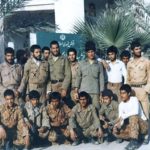
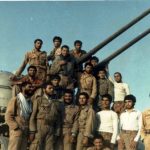
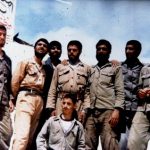
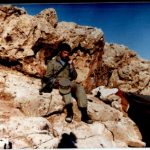
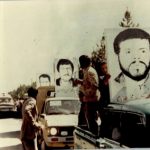
Comments
Post a Comment